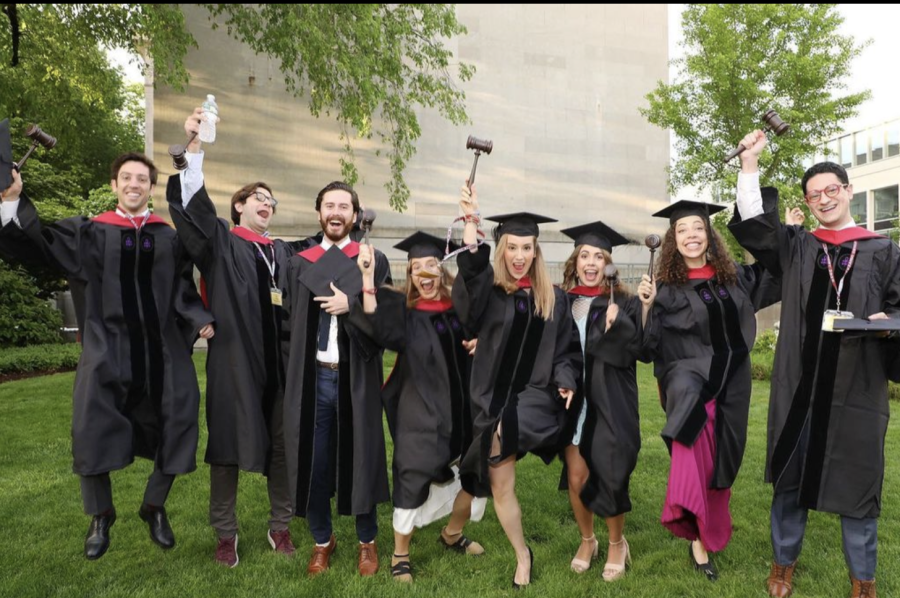So you think you want to go to law school?
September 25, 2022
There are four types of people who want to go to law school.
Person A: You have been told your whole life that you are really good at arguing and that being a lawyer would make an excellent career choice for a person of your stature.
Person B: Deep down, you don’t actually want to devote yourself to becoming a lawyer and fall into one of three categories. One, you’re doing it to please your parent(s). Two, you’re in it for the money, even if you have to sell your soul to corporate America to make a decent buck. Or three, you crave attention, getting off from the gratifying sensation of impressing a stranger just by uttering five little words: “I’m going to law school.” And all of a sudden, you’re one of the most competent people they know, without having to prove the slightest notion of intellect.
Person C: The rare breed who actually loves politics, the constitution, governance, justice, order – the law. Your driving force is deep-seated in your passion for helping others and serving the greater welfare.
Person D: Like Person C, while you plan to go into law school with intentions to represent the good in this world, chances are the lack of money in helping under-represented communities will deter you. You are someone who can be easily persuaded, and eventually, you’ll be shaped into a crooked attorney who works with the District Attorney’s office to get your guilty client a plea bargain they don’t deserve.
So, you think you want to go to law school? Before you even think about answering this question, consider what type of person you are and whether the benefits outweigh the cost.
If you’re anything like me, I consider myself one of the first three types of people, and I’ll be damned if I find I become Person D. I was told from a young age that my tenaciousness and innate ability to play the devil’s advocate in any given situation was irritating, but would prove resourceful as an attorney. I’d be lying if I said money and prosperity wasn’t a factor, especially considering my dream is to work in-house at The New York Times. That in itself has gotten me the validating, “that’s so cool,” from a new colleague and has stroked my ego more times than I can count. Studying Political Science in New York City, one of the most politically diverse cities in the nation, my love for governance, logical reasoning, methodical thinking and understanding of political ideology is at the foundation of my academic persona. I grew up with an attorney as a father, who ironically never wanted me to pursue law. But we are all a product of our environment, and thus the idea planted root at a ripe age.
So I learned very early on about the power-hunger force that drives an attorney to success. After four years of undergraduate education, aggressively studying for the Law School Admissions Test (LSAT), three years of law school and assuming you want to be a practicing attorney who wants more than just a Juris Doctorate (J.D.), you pass the Bar Exam and become a lawyer. You then have the ability to write orders and litigate disputes that can change the trajectory of people’s lives and the future of businesses and corporations. There is no greater power than the one you hold over the fate of another.
Now, unfortunately, no one seems to talk about the fact that the business and curriculum end of law school is built for the wealthy. And like most things in life, in order to make money, you need to have money.
Assuming you get decent financial aid, pursuing a career in the legal field still requires you to spend nearly hundreds of thousands of dollars at a four-year institution. Scholarships are also a possibility, and if you’re in the top one percent of applicants, you can bet you’ll get some money, maybe even a free ride. But don’t fool yourself; applying for scholarships is a whole other beast on its own. Then, you have to spend roughly $1,000 or more on studying material and a tutor for the LSAT to get a decent score, pay $200 to take the LSAT, pay $195 to subscribe to the Credential Assembly Service (CAS), the software required to apply to most law schools, pay an additional $45 for each score report you wish to send to universities, pay hundreds of thousands of dollars to attend law school and then pay $250 to take the Bar (in New York). At a minimum, you’re looking at spending $2,000 before you even step foot onto campus.
Finally, let’s say you pass the Bar, or after law school, you decide you don’t want to practice law and instead take your J.D. and run. Either way, you will have a large pile of debt waiting for you on the other side. Not to mention the money you have to spend on professional clothing and accessories for job interviews, networking lunches and dinners, all while paying for the cost of living your everyday life.
This isn’t to say that those without the resources to attend law school don’t make it. On the contrary, there are thousands of applicants nationwide and internationally that have undergone unimaginable hardship, and this is the reason why they want to go to law school in the first place. Law schools eat this kind of stuff up when sifting through applicants, trying to find the needle in the haystack that will open a window of diversity into a legal field that has been whitewashed for far too long.
So, you still think you want to go to law school? You have to be a fool to want to go broke and push yourself to the breaking point to get there, just to go even more broke and push yourself even further to the cliff’s edge once you make it. Ironically, I fall into this pool of fools, and if this hasn’t deterred you from wanting to pursue law school, then I plan to see you on the battlefield of LSAT Prep and admission deadlines come next fall.












